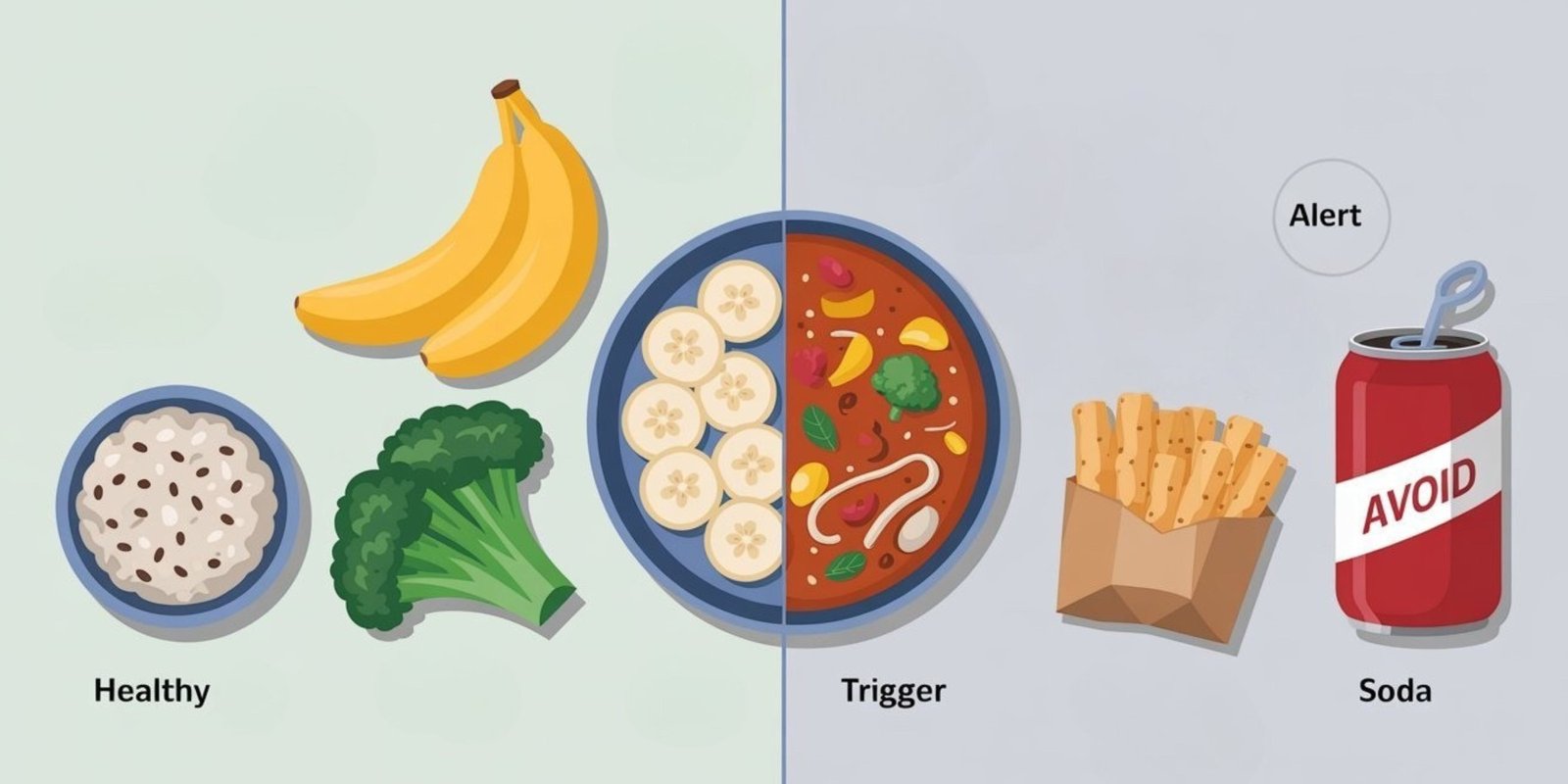

Dt. Natasha Mohan
Dietitian Natasha Mohan is one of the most influential and renowned nutritionist and dietitian, with over 3 Million Followers on YouTube and 200+ Million Views and with 10+ Years of Experience. Dietitian Natasha Mohan is a transformation expert, Motivational Speaker and Lifestyle Expert. She has touched million of lives. She specializes in Therapeutic Diets Like, PCOS/PCOD, Thyroid, Diabetes, Cholesterol, Blood pressure, and other lifestyle disorder.
Table of Contents
Best Acid Reflux Diet: Foods to Eat and Avoid Daily
Acid Reflux Diet plays a vital role in managing and reducing the uncomfortable symptoms of acid reflux, a condition where stomach acid flows back into the esophagus causing heartburn and indigestion. If you’re someone who frequently experiences acid reflux, changing your daily eating habits can make a noticeable difference. This comprehensive guide outlines the best foods to eat and what to avoid to control acid reflux naturally through diet.
Understanding Acid Reflux and Its Dietary Triggers
Acid reflux, also known as gastroesophageal reflux disease (GERD), is often triggered by certain foods and lifestyle choices. The lower esophageal sphincter (LES) normally prevents stomach acid from entering the esophagus. However, when the LES weakens or relaxes inappropriately, acid can escape, leading to reflux.
Dietary factors significantly influence the frequency and intensity of acid reflux symptoms. That’s why following a structured acid reflux diet can help restore balance and improve digestive health.
Foods to Eat Daily on an Acid Reflux Diet
Choosing the right foods can help reduce acid production and soothe the digestive tract. Here are the top foods that are gentle on your stomach:
1. Oatmeal
A great source of fiber, oatmeal absorbs acid and keeps you full, reducing the urge to overeat—a common reflux trigger.
2. Leafy Greens
Vegetables like spinach, kale, and broccoli are low in acid and rich in nutrients. They help balance stomach acidity and reduce inflammation.
3. Ginger
Known for its anti-inflammatory properties, ginger is excellent for gastrointestinal issues. Try adding fresh ginger to smoothies, teas, or meals.
4. Bananas and Melons
These fruits are low-acid and packed with vitamins. Bananas, in particular, are soothing and can coat the stomach lining.
5. Lean Meats and Fish
Grilled chicken, turkey, and fish are less likely to trigger reflux compared to high-fat meats. Avoid frying them—opt for baking or steaming instead.
6. Whole Grains
Brown rice, couscous, and whole grain bread promote digestion and are great staples in an acid reflux diet.
Foods to Avoid in an Acid Reflux Diet
Some foods can increase acid production or relax the LES, making reflux worse. Here are common triggers you should limit or eliminate:
1. Spicy Foods
Chili, pepper, and other spicy ingredients can irritate the esophagus and worsen symptoms.
2. Fried and Fatty Foods
Foods high in fat slow down digestion and increase stomach pressure, which can push acid back into the esophagus.
3. Citrus Fruits
Oranges, lemons, and grapefruits are highly acidic and may trigger reflux episodes.
4. Caffeine and Carbonated Drinks
Coffee, tea, and sodas can relax the LES and stimulate acid production.
5. Chocolate
It contains both caffeine and fat, making it a double threat for reflux sufferers.
6. Alcohol
Wine, beer, and spirits can irritate the stomach lining and relax the LES.
Tips for a Successful Acid Reflux Diet
Eat Smaller Portions: Overeating can cause bloating and increased acid pressure.
Don’t Lie Down After Eating: Wait at least 2–3 hours before lying down or sleeping.
Stay Hydrated: Drink water throughout the day but avoid large quantities with meals.
Chew Thoroughly: Eating slowly and chewing food well aids digestion and reduces reflux.
Track Your Triggers: Keep a food diary to identify and avoid personal reflux triggers.
Final Thoughts
Adopting a well-structured acid reflux diet is one of the most effective ways to manage and reduce symptoms without relying solely on medication. By focusing on foods that soothe the stomach and avoiding known triggers, you can significantly improve your digestive health. Simple, nutritious meals like moong dal chilla for weight loss can be excellent additions, as they are light, easy to digest, and packed with protein. Start with small changes, remain consistent, and observe how your body responds. A tailored acid reflux diet can help you regain control and enjoy your meals without discomfort.
Oatmeal with banana and a cup of herbal tea is a soothing, low-acid breakfast option ideal for an acid reflux diet.
Egg whites are generally safe, but egg yolks are high in fat and may trigger symptoms in some people.
Low-fat or plant-based milk like almond or oat milk is better than full-fat milk, which may worsen reflux.
Plain, low-fat yogurt can be soothing and provide probiotics, but flavored yogurts with added sugar should be avoided.
Most people notice improvements within 1–2 weeks of consistently following an acid reflux diet.


